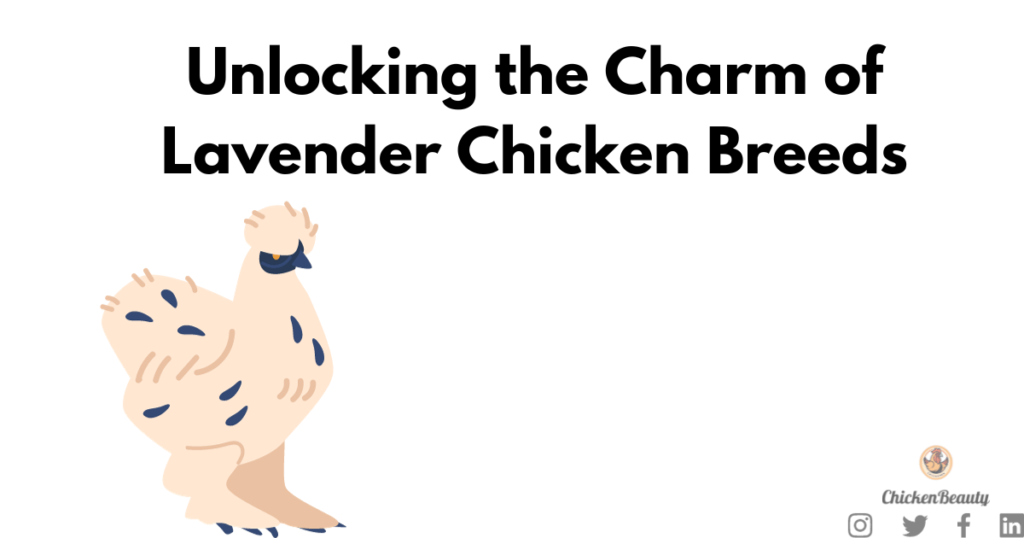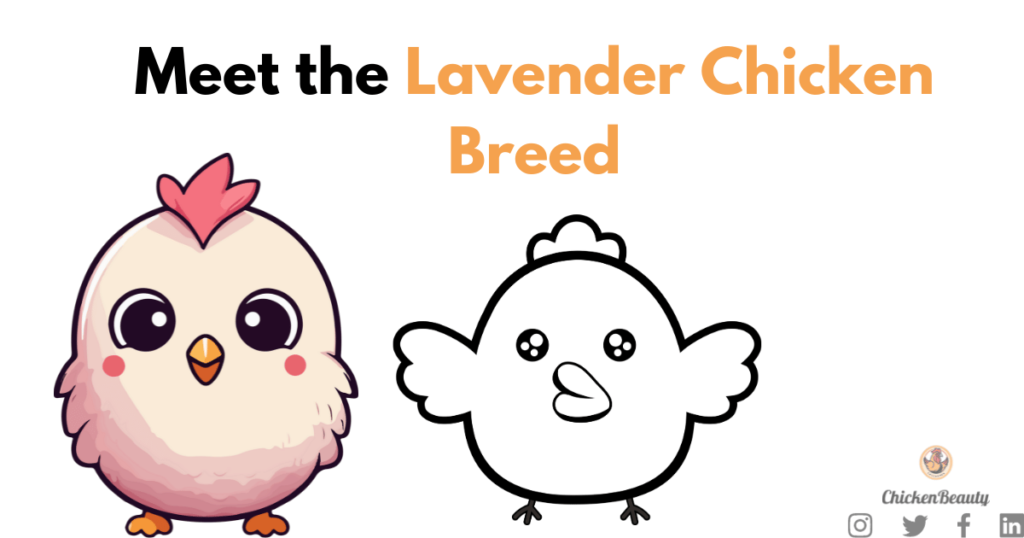Lavender Chicken Breeds Are you tired of the same old cluckers in your backyard? Looking to add a touch of elegance and a dash of lavender to your flock? Well, you’re in for a feathery treat! In this down-to-earth article, we’ll delve into the world of lavender chicken breeds, and trust me, it’s not as fragrant as it sounds.

What are Lavender Chicken Breeds
“Lavender” in the context of chicken breeds typically refers to a specific colour variation rather than a separate breed. Lavender is a type of blue coloration in chickens, and it can appear in various breeds. Chickens with lavender colouring have a soft, pale grey-blue plumage that is quite distinctive and visually appealing.
Some chicken breeds that can have lavender variations include:
Lavender Orpington: The Lavender Orpington is a variety of the Orpington breed, known for its friendly disposition and large, fluffy appearance. Lavender Orpingtons have the lavender colouring in their feathers.
Lavender Ameraucana: Ameraucanas are known for their blue eggs, and some strains have lavender colouring. These chickens are medium-sized and have muffs and beards.
Lavender Wyandotte: Wyandottes are a popular breed, and some come in lavender varieties. They have a distinctive rose comb and are known for being good layers.
Lavender Araucana: Araucanas are similar to Ameraucanas in that they lay blue eggs. Some Araucanas can have lavender plumage.
It’s worth noting that the lavender colouring can vary slightly in intensity among individual birds, but it generally gives them a unique and attractive appearance. Lavender is a recessive genetic trait, so breeders specifically select for it when working with these chicken breeds.
Caring for Lavender Chickens
Caring for these chickens Lavender Chicken Breeds is relatively straightforward, and with proper attention, they can thrive and provide you with fresh eggs and companionship. Here’s a guide on how to care for lavender chickens:
Housing:
Provide a secure and spacious coop for your lavender chickens. The coop should protect them from predators, adverse weather conditions, and have proper ventilation.
Ensure each chicken has about 2-3 square feet of space inside the coop, with outdoor access to a run or fenced area during the day.
Bedding:
Use appropriate bedding materials like straw, wood shavings, or hay to keep the coop clean and comfortable. Change the bedding regularly to prevent moisture buildup and odour.
Feeding:
Offer a balanced diet that includes a good-quality chicken feed, preferably a layer feed for hens that are laying eggs.
Provide fresh water daily, and make sure it’s easily accessible to all chickens.
Grit and Treats:
Chickens need grit to aid in digestion. You can offer a small dish of poultry grit, or they can find it naturally if they have access to soil or gravel.
Treats like vegetables, fruits, and mealworms can be given in moderation as supplemental snacks.
ALSO READ 👇
The Craziest Weird Chicken Breeds 2023
Unlock the Hidden Power of Chicken Feet Health Benefits
Feathered Foodies: Can Chickens Eat Carrot Tops?
The Ultimate Guide to Giant Chicken Breeds
Fluffy Chicken Breeds: Where Cuteness Meets Feathers
The Ultimate Guide to Building Chicken Breeding Pens for Maximum Efficiency
Health and Hygiene:
Perform regular health checks to detect any signs of illness or injury. Look for symptoms like lethargy, abnormal behaviour, or changes in appetite.
Keep the coop and nesting boxes clean to prevent the buildup of mites, lice, and other pests.
Trim their beaks and nails if they become too long, but be cautious not to hurt them.
Egg Collection:
Lavender Chicken Breeds Check the nesting boxes daily for eggs. Lavender Orpingtons are known for being good layers, so you can expect a steady supply of eggs.
Gather eggs promptly to prevent them from becoming soiled or damaged.
Social Interaction:
Lavender chickens are known for their friendly and docile nature. Spend time with them to build trust and socialise.
Avoid overcrowding, as this can lead to stress and aggression among the chickens.
If you plan to breed lavender chickens, ensure you have a suitable rooster and nesting boxes for broody hens.
Research breeding techniques and be prepared to care for the chicks if you intend to hatch eggs.
Veterinary Care:
Establish a relationship with a poultry veterinarian for regular check-ups and advice on chicken health.
Caring for lavender chickens can be a rewarding experience, and they can make lovely additions to your backyard flock. By providing them with a safe and comfortable environment, a balanced diet, and regular attention, you can enjoy their company and the fresh eggs they produce.
Meet the Lavender Chicken Breed
Lavender Chicken Breeds A Royal Beauty
First things first, let’s meet our lavender superstar – the Lavender Orpington. Picture a chicken with soft, lavender-coloured feathers, and you’re spot on. These chickens are the divas of the coop, strutting around like they own the place. They’re known for their sweet temperament, which is a stark contrast to their glamorous appearance.

Why Lavender Chickens?
Egg-citing Unique Eggs
Now, you might be wondering, “What’s so special about lavender chickens?” Well, aside from being conversation starters at poultry parties, they lay beautiful light brown eggs. If you’re tired of the same old white eggs, these lavender ladies will bring some colourful flair to your breakfast table.
Keeping Lavender Chickens
Easygoing Companions
Lavender Chicken Breeds are quite low-maintenance. They’re like the laid-back cousin of the chicken world. They’ll need your usual chicken amenities: food, water, and a safe coop. But what sets them apart is their calm and friendly nature. They’ll be your feathered buddies in no time, without any diva demands.
Fun Fact: Lavender Oil Perfume for Chickens?
Feathered Fragrance Fanatics
Lavender Chicken Breeds aren’t just fashionable; they’re also fans of the aroma. Some poultry enthusiasts claim that lavender oil can be soothing to chickens and even deter pests. Just don’t be surprised if your chickens start attending aromatherapy sessions!
A Word of Caution: Lavender is Not for Eating!
Purple or Poison?
Here’s where we throw in a word of caution. Lavender chickens are not edible. While their eggs are perfectly safe for breakfast, their feathers are not meant for your dinner plate. Eating them is a no-no, unless you fancy a side of indigestion.
Conclusion: Lavender Chicken Breeds
So, there you have it, folks – the world of lavender chicken breeds is as unique as it is charming. They may not be the most practical addition to your flock, but they sure know how to turn heads and lay lovely eggs. Just remember, they’re not the type to request a lavender-scented coop, but they’ll appreciate the extra touch of class.
So, if you’re ready to add a touch of lavender glamour to your poultry party, consider the Lavender Orpington. Who knows, you might just become the talk of the chicken coop circuit!
FAQs Lavender Chicken Breeds
Are lavender chicken breeds suitable for beginners?
Lavender chicken breeds are indeed suitable for beginners due to their friendly nature and ease of care.
What is the average lifespan of lavender chickens?
With proper care, lavender chickens can live for 6 to 8 years on average.
Do lavender chickens require special grooming?
While regular grooming is beneficial, lavender chickens are relatively low-maintenance compared to some other breeds.
Can lavender chickens be kept in urban settings?
Yes, they can thrive in urban environments, provided they have a secure coop and proper care.
Are lavender chicken eggs any different from regular chicken eggs?
Lavender chicken eggs are similar in taste and nutritional value to eggs from other breeds but may have a slightly lighter shell colour.
